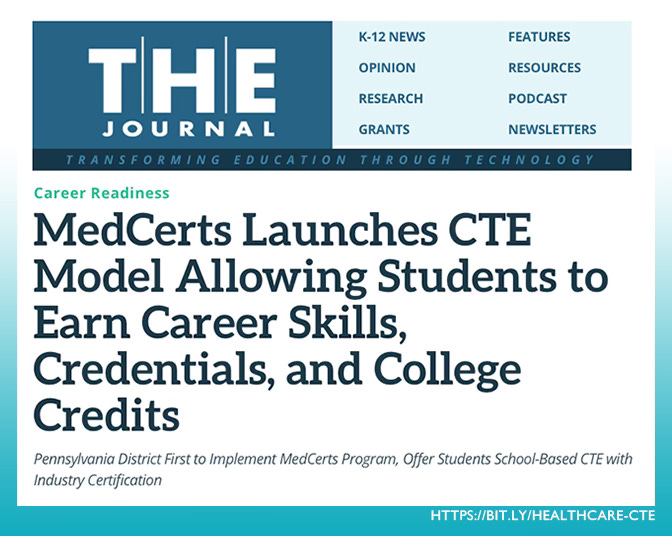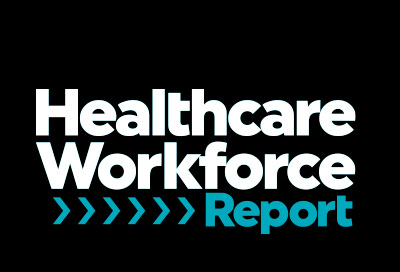New high schools will graduate students into healthcare careers
Bloomberg Philanthropies launches $250M initiative in 10 urban and rural communities
Remember the recent Healthcare Workforce Report that featured MedCerts’ new healthcare training curricula built specifically for high school Career and Technical Education programs?
Excerpt, to refresh your memory:
Emerge Education, a Pennsylvania-based workforce and education consulting nonprofit, and online training and credentials platform MedCerts (the sponsor of this newsletter) recently unveiled a pilot program started two years ago that allows high-schoolers at Cumberland Valley School District to participate in a new kind of CTE program that doesn’t require a “seat” at their regional CTE campus.
CVHS students in the pilot are about to graduate high school with an industry-recognized credential, career-ready skills for healthcare jobs — and they earn college credits with the certification, too, in case they decide to go to college later in their career.
The MedCerts Healthcare Training Program for high schools includes online training provided by MedCerts, which offers college credits for its healthcare and IT CTE programs from seven higher education institutions.
The cost per student is the same or less than a typical CTE per-student cost is, Emerge told me for this report I wrote for THEJournal.com. It is the same cost that an individual would pay for the same online certification course taken independently, or about $4,000. But in this MedCerts program with Emerge, that cost for a high school student to participate includes hands-on training with a local healthcare employer.
The school doesn’t have to hire any new staff to offer the program, though a guidance counselor is needed to usher students into and through the program and support them through passing their certification exam.

A massive project that bypasses existing (overwhelmed) CTE programs
Earlier this month, Bloomberg Philanthropies took this model a step further as it unveiled a $250 million initiative to create new high schools around the nation that will graduate students directly into high-demand healthcare jobs that pay enough to raise a family on. The schools are projected to open between late 2024 and late 2026 and will serve 6,000 students in total, the nonprofit said.
The initiative partners public education systems with regional hospitals in 10 communities:
Boston, Massachusetts
Charlotte, North Carolina
Dallas, Texas
Durham, North Carolina
Houston, Texas
Nashville, Tennessee
New York, New York
Philadelphia, Pennsylvania
Demopolis, Alabama
Northeast Tennessee (six rural locations)
Each school “will provide traditional academic programming, as well as specialized healthcare classes co-taught by (the local partner) health system employees using co-designed curriculum,” Bloomberg Philanthropies said. Coursework will include immersive work-based learning at the partner healthcare system.
According to the initiative’s plans, students in ninth and tenth grades will participate in job-shadowing and practice their skills in simulation labs; starting in eleventh grade, students will have access to paid healthcare internships and professional mentoring, among other work-based learning experiences. Each of the health system partners have “committed to providing job opportunities who successfully complete the graduation requirements of their respective programs,” according to the nonprofit.
All the participating health systems have committed to providing job opportunities for students who successfully complete the graduation requirements of their respective programs, the nonprofit said.
Every student will have the opportunity to earn industry-recognized credentials, certifications, and college credits while enrolled in the new high schools; upon graduation, students can choose to to begin their career at the partner health system and/or they also may enroll in post-secondary courses as a full- or part-time college student.
Examples of jobs that graduates of the new schools will be prepared to enter include surgical technologist ($56,000 median starting salary), radiology technician ($65,000 median starting salary), or respiratory therapist ($71,000 median starting salary).
“For too long, our education system has failed to prepare students for good jobs in high-growth industries,” said Michael R. Bloomberg, founder of Bloomberg Philanthropies and Bloomberg L.P. and 108th mayor of New York City. “By combining classroom learning with hands-on experience, these specialized healthcare high schools will prepare students for careers with opportunities for growth and advancement. America needs more healthcare workers, and we need a stronger, larger middle-class — and this is a way to help accomplish both goals.”
Bloomberg Philanthropies’ grants will support school start-up costs including personnel needs and classroom and lab renovations, according to a news release. The nonprofit also said it will cover healthcare-specific work-based learning costs such as developing specialized curricula, lab materials and equipment and stipends for work-based learning.
In Durham, North Carolina, the public school system partnered with Durham Technical Community College and Duke University Health System for its new healthcare high school, which some are calling an “early college” high school because the students there can simultaneously earn a high school diploma and an associate’s degree or the workforce credential of their chosen occupation.
Durham’s school “will prepare students for careers in nursing, allied health, surgical tech and clinical research,” according to a NC Newsline report. An apprenticeship program through the Duke University School of Medicine will also be available for students to pursue clinical research.
Duke Health said it expects to hire at least 60 students after they graduate from the new school, which is projected to open in the fall of 2025 with 100 ninth-graders. The school will be part of the Durham Public Schools system and will be operated jointly by the district and the community college, according to NC Newsline. DPS will provide high school teachers, a principal, support staff, student services, and curricular resources. Students will also be dually enrolled at DTCC.
Absent massive influxes of grant funds, school districts anywhere in the country can start a healthcare CTE program thanks to the MedCerts High School Training program. Secondary educators and administrators interested in more information can email Jennifer Kolb, jkolb@medcerts.com, for more information. Learn more about how the program works in this in-depth report at THEJournal.com.
Shout-out to Healthcare Workforce Report sponsors
The Healthcare Workforce Report newsletter is generously supported by MedCerts.
For information on supporting HWR, email HealthcareWorkforce@substack.com.





